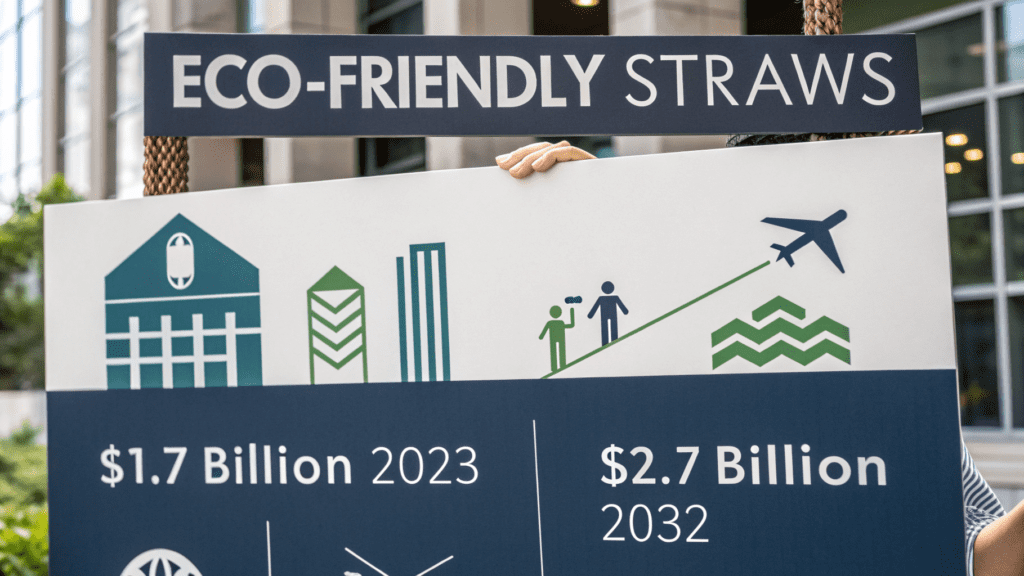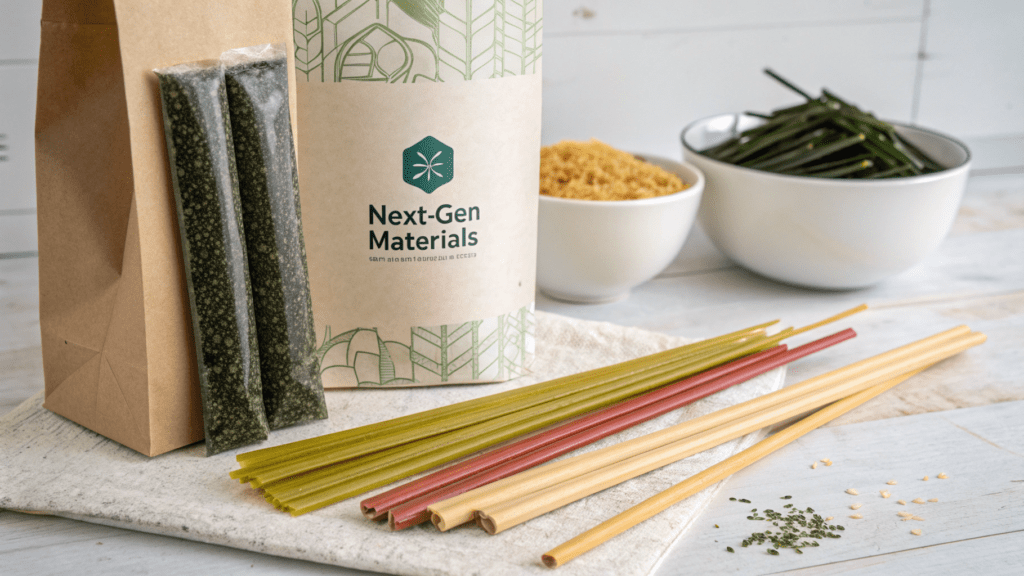
The escalating global plastic crisis is no longer a distant environmental concern; it is a pressing operational and commercial challenge demanding urgent action from high-volume industries like hospitality and aviation. Hotels and airlines, as front-line providers of guest services, find themselves at a critical juncture, navigating a complex landscape shaped by rapidly evolving regulatory pressures, pronounced shifts in consumer preferences, and an undeniable imperative for corporate responsibility.
Ignoring this paradigm shift carries significant commercial implications, from potential fines and reputation damage to alienating an increasingly eco-conscious clientele. Individually wrapped compostable straws offer a compelling dual solution, marrying stringent hygiene requirements—paramount in service industries—with critical environmental stewardship. This strategic adoption not only addresses an immediate environmental crisis but also provides a tangible competitive advantage. This post offers strategic insights for procurement managers, operations directors, sustainability officers, and supply chain executives, exploring the market dynamics, regulatory landscape, and tangible benefits of this essential transition.
I. The Imperative for Change: Market Growth & Regulatory Pressure for Individually Wrapped Compostable Straws
The call for sustainable solutions resonates louder than ever, driven by both market forces and legislative mandates. For hotels and airlines, the shift away from single-use plastics is not merely an option but a strategic necessity.
A. Surging Demand for Sustainable Solutions: $2.7 Billion Eco-Friendly Straws Market by 2032
The global eco-friendly straws market is experiencing exponential growth, projected to reach an impressive$2.7 billion by 2032, growing at a Compound Annual Growth Rate (CAGR) of 5.3% from its 2023 valuation of $1.7 billion. This upward trajectory is a direct response to a significant consumer shift: a remarkable80% of consumers now express a preference for eco-friendly products, directly influencing corporate sustainability initiatives and procurement decisions.
This trend extends beyond straws to the broader compostable packaging market, which is set to expand from $99.6 billion in 2023 to $369.9 billion by 2032, a robust 15.7% CAGR. These figures underscore a clear market signal: sustainability is no longer a niche, but a mainstream driver of purchasing decisions and a critical factor in maintaining market relevance.
B. Navigating the Regulatory Landscape: EU SUPD & Global Plastic Bans
The regulatory environment is swiftly moving to curb plastic pollution, creating a compliance imperative for international operators. TheEuropean Union’s Single-Use Plastics Directive (SUPD)is a cornerstone of this shift, aiming to significantly curb plastic straw consumption by 2026. This directive makes certified compostable straws the only compliant alternative for hospitality venues operating within the EU.
Beyond Europe, the movement for plastic reduction is global. China prohibited non-degradable disposable plastic straws in catering nationwide by 2021, and India outlawed them in 2022. In the U.S., cities like Seattle led the way, implementing ordinances in 2018 requiring foodservice businesses to use durable or compostable straws, achieving a 77% compliance rate. Such regulations not only mandate change but also expose businesses to potential penalties and reputational damage if ignored, making proactive compliance a strategic advantage.Proactive compliance with global plastic bans offers a strategic advantage for hotels and airlines.

II. Unpacking Individually Wrapped Compostable Straws: Types and Benefits
The term “compostable” carries specific meaning and verified standards, differentiating it from less impactful “biodegradable” claims. Understanding the nuances of available materials and their certifications is critical for informed procurement decisions.
A. Beyond Paper: Diverse Materials for Sustainable Straws
While paper straws currently lead the market with a significant 44.3% market share in 2025 due to their rapid biodegradation (2-6 weeks compared to plastic’s 200 years), innovation in materials offers increasingly robust and versatile alternatives:
- PHA (Polyhydroxyalkanoates) straws: Represent cutting-edge bioplastic technology. Materials like BIOLO-certified PHA straws are notable for being home, industrial, and marine-degradable, breaking down in less than 180 days without leaving microplastics. They offer superior durability and feel similar to traditional plastic.
- PLA (Polylactic Acid): Derived from renewable resources like corn starch or sugarcane, PLA is a common bioplastic choice. However, it typically requires specific industrial composting facilities to break down effectively.
- Innovative Materials: Beyond these, the market is seeing the emergence of straws made from rice, sugarcane fiber (bagasse), grass, and even edible straws. These offer unique durability and degradation profiles, expanding the range of choices for specific operational needs. For a deeper dive into material distinctions, explore our guide on compostable vs. biodegradable straws.
B. The Hygiene Advantage: Individually Wrapped Compostable Straws Ensure Safety
In high-traffic, guest-facing environments like hotels and airlines, hygiene is non-negotiable. Individual wrapping is critical for maintaining an immaculate and pristine product, preventing contamination from handling and environmental exposure. This ensures a untouched straw for every guest, which is vital for upholding health and safety standards and significantly enhancing the perception of service quality and guest trust. This level of sanitary assurance becomes a critical differentiator, especially in a post-pandemic world where cleanliness is a top priority for travelers.
C. Certifications and Standards: Ensuring True Compostability
The terms “compostable” and “biodegradable” can be a minefield of misinformation if not backed by rigorous third-party certification. For B2B decision-makers, understanding these standards is paramount to avoid “greenwashing” and ensure genuine environmental impact.
- BPI (Biodegradable Products Institute) Certification (ASTM D6400, D6868): This certification verifies a product’s complete breakdown in industrial composting facilities. Since January 2020, BPI has mandated that all certified items contain no intentionally added PFAS chemicals, with total organic fluorine levels verified to be below 100 ppm, ensuring the compost remains free from these persistent “forever chemicals.” For a comprehensive understanding of BPI standards, refer to our BPI compostable vs. biodegradable sustainability guide.
- TÜV Austria: Offers “OK compost INDUSTRIAL” (equivalent to EN 13432) and “OK compost HOME” certifications, confirming a product’s ability to decompose in various settings, including marine degradation.
These certifications provide procurement teams with the confidence that their chosen products will perform as advertised and genuinely contribute to waste diversion, rather than simply ending up as lingering pollutants in landfills.Certified compostable straws offer superior hygiene and verified environmental benefits for hospitality.

III. Strategic Implementation: Operational Impact and ROI of Individually Wrapped Compostable Straws
Transitioning to compostable straws involves more than a simple product swap; it’s a strategic decision with measurable operational and financial impacts.
A. Operational Considerations for Procurement and Supply Chains
While the long-term benefits are clear, switching from traditional plastic may incur short-term cost increases for new alternatives and require process adjustments. Ensuring a stable supply chain with certified manufacturers is vital for consistent product availability and quality, especially given the rising demand. Furthermore, storage requirements for certain compostable materials may differ, necessitating adjustments to existing logistics and inventory management. Procurement teams must conduct thorough due diligence to secure reliable, certified suppliers who can meet their volume and quality needs.
B. Feature Comparison: Compostable vs. Traditional Straws
| ባህሪይ | B2B የሥራ አፈፃፀም ተፅእኖ | የማስታወሻ ማስታወሻ | ሮይ አቅም |
|---|---|---|---|
| ቁሳቁስ | PHA, Paper, PLA, Rice, Agave (diverse options) | Adherence to specific compostability standards (ASTM, EN) | Varies; PHA higher initial cost, superior environmental/durability return |
| Degradation | Requires industrial composting for most; some home/marine | Certified compostable (BPI, TÜV Austria); clarifies “biodegradable” | Reduced landfill costs, improved waste management efficiency |
| ጠንካራነት | Varies by material (e.g., paper can get soggy); PHA more robust | Performance standards for specific uses (hot/cold drinks) | Enhanced guest satisfaction, fewer product-related complaints |
| Wrapping | Paper/compostable film; maintains hygiene, portion control | Meets stringent food safety and sanitation guidelines | Boosted brand image, higher perceived value from guests |
| ወጪ | Generally higher upfront than conventional plastic | Aligns with impending plastic bans and sustainability goals | Long-term brand equity, competitive advantage, compliance cost avoidance |
C. Measuring ROI: Beyond Purchase Price
The return on investment (ROI) for adopting individually wrapped compostable straws extends far beyond the initial purchase price, impacting brand perception, market share, and long-term operational costs.
- የተሻሻለ የምርት ስም Studies show that 73% of travelers actively prefer eco-friendly accommodations. Adopting sustainable practices like compostable straws directly aligns with these consumer values, positioning your brand as a responsible industry leader.
- Compliance Cost Avoidance: Proactive adoption helps businesses avoid penalties and legal issues from escalating plastic bans and environmental regulations, safeguarding financial stability and market access.
- Attracting Eco-Conscious Consumers: As sustainability becomes a key purchasing driver, offering compostable alternatives can attract and retain a growing segment of environmentally aware customers, driving market share and building long-term loyalty.
- Reduced Waste Management Costs: Diverting waste from landfills to composting facilities can lead to significant savings in waste disposal fees, particularly in regions with established composting infrastructure and landfill taxes.
Adopting compostable straws offers significant ROI through enhanced brand reputation and compliance cost avoidance.

IV. Leading the Charge: Hotel and Airline Adoption of Individually Wrapped Compostable Straws
Major players across the hospitality and aviation sectors are already making substantial commitments to eliminate single-use plastics, demonstrating the viability and strategic importance of this transition.
A. Hotels Embracing Sustainable Straws
The hotel industry has seen widespread commitment to straw reduction and elimination:
- Marriott International aimed to eliminate 1 billion plastic straws annually by July 2019 across its 6,500 properties.
- Four Seasons Hotels & Resorts announced a ban on plastic straws across all 110 hotels by the end of 2018.
- Hilton committed to removing plastic straws from its 650 managed hotels globally by the end of 2018, estimating a saving of 35 million straws annually.
- Kimpton Hotels and Restaurants are actively reviewing policies to offer compostable, metal, or no straws by default, reflecting an industry-wide shift away from plastic.
- 1 Hotels እና Hyatt Hotels have also implemented initiatives to reduce or eliminate plastic straws, offering biodegradable options or providing them only upon request.
These examples underscore a collective industry recognition of the need for change and the competitive advantage gained by demonstrating environmental leadership.
B. Airlines Prioritizing Eco-Friendly Straws
The aviation sector, with its unique operational complexities, is also making strides:
- American Airlines replaced plastic straws with biodegradable alternatives and wooden stirrers, cutting an estimated 71,000 pounds of plastic annually.
- Alaska Airlines phased out 22 million plastic straws and stirrers used in 2017, acknowledging their significant landfill impact.
- Ryanair aims to remove all non-recyclable plastics from its aircraft by 2023, transitioning to biodegradable cups and paper packaging as part of its sustainability goals.
- Delta Airlines has also embarked on significant efforts to remove various single-use plastic items, including stir sticks and straws, from aircraft and Sky Clubs, expecting to eliminate over 300,000 pounds of plastic waste annually.
C. Case Study: HMSHost’s PHA Straw Transition in Airports
A compelling example of successful strategic implementation comes from global travel restaurateurHMSHost. Starting in January 2023, HMSHost partnered with BIOLO to introduce PHA biodegradable straws in numerous dining venues across US airports in states like California, Washington, Texas, North Carolina, and Florida. This strategic initiative aims to eliminate millions of single-use plastic straws annually from HMSHost’s North American airport operations.
The decision to adopt PHA straws was significant, occurring after the company’s previous trials with paper straws proved unsatisfactory in performance. This highlights a crucial lesson: the importance of material selection and testing to ensure that sustainable alternatives meet operational demands for durability and guest satisfaction, even in high-volume, dynamic environments like airports. This transition by a major food service provider demonstrates the tangible benefits and scalability of individually wrapped compostable straws in a demanding B2B context.Major hospitality and aviation players are successfully transitioning to compostable straws, demonstrating viability.
V. Overcoming Challenges: Logistics and Infrastructure for Individually Wrapped Compostable Straws
While the benefits are clear, successful implementation requires addressing existing challenges, particularly around waste management infrastructure and product performance perceptions.
A. The Composting Infrastructure Gap
A significant barrier to widespread adoption remains the limited availability of accessible industrial composting facilities in many regions. Without proper waste management infrastructure, even certified compostable straws may still end up in landfills, negating their environmental benefits and undermining the investment. This highlights the need for continued advocacy for, and investment in, robust composting infrastructure. For detailed guidance on managing BPI-certified compostable products, refer to ourB2B playbook for sustainable waste management.
B. Cost-Effectiveness and Performance of Sustainable Straws
Compostable options can be significantly more expensive initially; some reports indicate costs up to four times higher than traditional plastic straws, as experienced by Joe Coffee when they transitioned. Performance concerns also exist, such as certain paper straws getting soggy quickly, potentially impacting customer satisfaction. However, continuous research and development in materials like PHA are crucial for addressing durability, heat resistance, and cost-effectiveness, bringing prices down and performance up over time. The HMSHost case study exemplifies how material science advancements can overcome previous performance limitations.
C. Navigating Greenwashing and Misinformation
The lack of globally consistent terminology for “recyclable,” “compostable,” and “biodegradable” can create confusion for both industry professionals and consumers. Rigorous third-party certification from bodies like BPI or TÜV Austria is essential to counter misleading “greenwashing” claims. Beyond certification, educating both staff and consumers on proper disposal methods is vital for ensuring compostable products complete their intended life cycle, maximizing their environmental value.Addressing infrastructure gaps and misinformation is crucial for successful compostable straw adoption.

VI. The Future of Individually Wrapped Compostable Straws: Innovation and Collaboration
The trajectory for individually wrapped compostable straws is one of continuous innovation, driven by material science breakthroughs and a concerted effort towards industry-wide collaboration and policy harmonization.
A. Advancements in Material Science
The horizon for compostable straw materials is expanding rapidly:
- New Bio-based Polymers: Innovations such as stereo-complexed poly (lactic acid) (SC-PLA) are improving product performance, especially for heat resistance and durability.
- Novel Materials: The development of innovative materials like edible seaweed-based straws (biodegrading in under 60 days) and mushroom-derived plastics signals future possibilities for even more sustainable and rapidly degradable options.
- Ultra-Rapid Biodegradation: Research into straws made from unused rice and rice bran demonstrates potential for ultra-rapid biodegradation within four days, opening new avenues for truly ephemeral single-use items.
These advancements promise to address existing performance and cost challenges, making compostable straws an even more attractive and viable solution.
B. Industry Collaboration for Sustainable Practices
Collective action is vital for accelerating the shift to sustainable practices:
- The Global Tourism Plastics Initiative (GTPI): Encourages signatories, including major hotel groups and airlines, to achieve 100% reusable, recyclable, or compostable packaging by 2025.
- The International Air Transport Association (IATA): Recommends the installation of industrial composting plants at airports to facilitate waste diversion, recognizing the unique challenges of airline waste management.
- “Stay Plastic Free”: Initiatives like this provide vital vendor toolkits to inspire broader adoption and simplify the procurement process for hotels seeking plastic alternatives.
Such collaborations foster shared knowledge, accelerate best practices, and build the necessary infrastructure for a truly circular economy.
C. Policy Evolution and Global Harmonization
The regulatory landscape is set for further evolution and harmonization:
- Growing Federal and State-Level Bans: A strong push towards sustainable alternatives continues through expanding bans on single-use plastics.
- Revised International Civil Aviation Organization (ICAO) Regulations: Needed to enable diversion of recyclable and recoverable waste from incineration, supporting biotreatment and material recovery at airports.
- Harmonization of Standards: Consistent compostability standards across regions will streamline procurement and reduce complexity for international operations, simplifying compliance for global brands.
These policy changes will create a more conducive environment for sustainable choices, making compostable straws the default, rather than the alternative.Future innovations and collaborations will accelerate the widespread adoption of compostable straws.
ተደጋግሞ የሚነሱ ጥያቄዎች
Why should hotels and airlines switch to individually wrapped compostable straws?
Switching to individually wrapped compostable straws helps hotels and airlines meet escalating environmental regulations, satisfy eco-conscious consumer demand, enhance brand reputation, and ensure superior hygiene for guests, all while reducing plastic waste.
Are compostable straws truly hygienic for high-volume service environments?
Yes, individually wrapped compostable straws are designed to maintain pristine hygiene. The individual wrapping prevents contamination from handling and environmental exposure, ensuring a sanitary product for every guest, which is crucial for health standards in hotels and airlines.
What are the best materials for compostable straws for hospitality and aviation?
While paper straws are common, advanced materials like PHA (Polyhydroxyalkanoates) offer superior durability and feel, being home, industrial, and marine-degradable. PLA (Polylactic Acid) is another option, though it typically requires industrial composting. The best choice depends on specific operational needs and waste infrastructure.
How can hotels and airlines ensure their compostable straws are genuinely eco-friendly?
To ensure genuine eco-friendliness, procurement teams should look for third-party certifications like BPI (Biodegradable Products Institute) or TÜV Austria’s ‘OK compost INDUSTRIAL’ or ‘OK compost HOME’. These certifications verify that products will break down as advertised and are free from harmful ‘forever chemicals’ like PFAS.
What are the ROI benefits of adopting compostable straws beyond environmental compliance?
Beyond compliance, the ROI includes enhanced brand reputation (attracting eco-conscious travelers), avoidance of regulatory penalties, increased market share from sustainability-driven consumers, and potential reductions in waste management costs by diverting waste to composting facilities.
ማጠቃለያ
The transition to individually wrapped compostable straws represents a strategic imperative for hotels and airlines, driven by escalating market demand, evolving regulatory pressures, and a profound commitment to environmental stewardship. While challenges remain in infrastructure development and initial investment, continuous innovation in material science and collaborative industry efforts are paving the way for scalable, effective solutions.
Embracing these sustainable alternatives not only mitigates critical environmental impact but also significantly enhances brand value, reinforces corporate social responsibility, and builds operational resilience in a rapidly changing global landscape. For forward-thinking decision-makers in procurement, operations, and sustainability, the shift to individually wrapped compostable straws is a clear path to both ecological responsibility and enduring commercial success.
Assess your current plastic straw usage and initiate a comprehensive plastic audit today. Partner with certified suppliers to transition to individually wrapped compostable straws and elevate your brand’s commitment to a sustainable future, reducing your environmental footprint and meeting evolving consumer expectations.ዘላቂ ለሆኑ መፍትሄዎች ያግኙን






